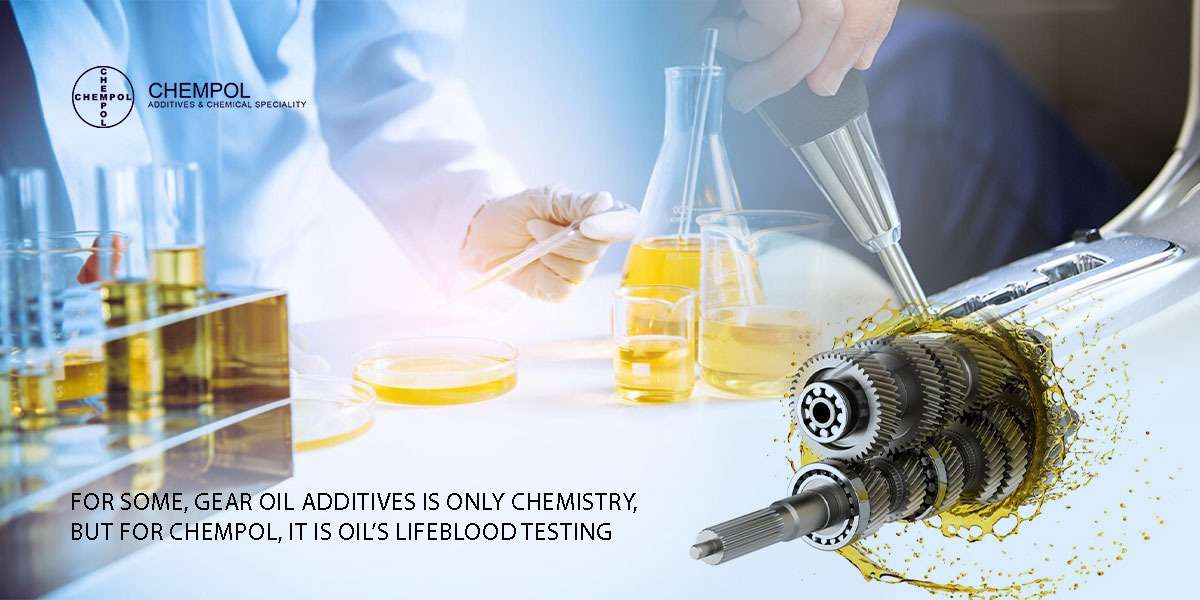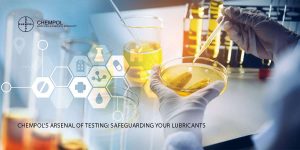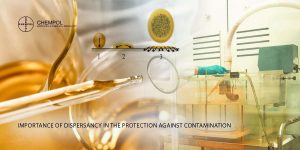
For Some, Gear Oil Additives Is Only Chemistry, but For Chempol, It Is Oil’s Lifeblood Testing
There are many ways to test how well a lubricant additive works. The most important tests depend on what the lubricant will be used for. It’s important to remember that additives are just one part of a good lubricant – the base oil matters too!
At Chempol, we recognise that gear oil additives are crucial to the longevity and top performance of your machinery, despite the fact that they may appear to be relatively insignificant components or elements. Beyond fundamental formulations, our methodology goes further. We dive into the science of lubrication in order to develop additives that safeguard, optimise, and infuse your gear systems with a fresh lease on life.
When It Comes To Performance, Formulations Are Valuable
There are no off-the-shelf solutions available from Chempol. Through painstaking research and development, our team creates individualised chemical additives compositions that are adapted to particular gear types, operating conditions, and the specific requirements of your equipment. From extreme pressure protection for heavy-duty gear to better thermal stability for high-speed applications, we take great care in selecting components in order to create solutions that are specifically tailored to meet the needs of our customers.
Outside Of The Laboratory: Extensive Testing
Not only do we develop additives, but we also put them through rigorous testing. The quality of our in-house testing exceeds the norms of the industry. We use specialised rigs to imitate the stress that occurs in the actual world, measuring parameters such as the reduction of wear, the management of friction, and the health of the lubricant over the long term. This guarantees that our additives are not merely theoretical answers; rather, they give a performance that has been shown.
Known As The “Silent Enemy,” Friction
Friction control is the primary emphasis of Chempol. How come? Mainly due to the fact that friction is the primary cause of wear, heat accumulation, and energy loss. In order to reduce the amount of metal-on-metal contact, we manufacture additives that produce lubricating coatings that are extremely smooth. Consequently, this results in a longer gear life, more efficiency, and equipment that operates at a lower temperature.
The Influence Of Numbers At The Base
The gear oil industry relies heavily on-base numbers, also known as BN. Its ability to neutralise toxic acids that have formed over time is shown in these characteristics. The formulations that Chempol uses include additives that contribute to a robust BN, which protects gear systems from corrosive wear and extends the life of the oil.
Chempol’s Arsenal Of Testing: Safeguarding Your Lubricants

Following are some of the most critical parameters, along with the standardized testing methods, in no particular order:
Viscosity
Viscosity is a critical indicator of a lubricant’s performance. Chempol employs rigorous viscometric testing, adhering to ASTM D445 standards or modified methods as needed. We carefully measure the flow time of lubricants through precisely calibrated instruments. This data tells us how well a lubricant will maintain its protective properties under varying temperatures and pressures.
Chempol doesn’t just test base oils. Our analysis extends to how our viscosity improver. The right additive package can enhance viscosity stability across a wider temperature range, ensuring consistent lubrication in both cold starts and under the intense heat generated within gearboxes. This translates to reliable protection, smoother operation, and reduced wear for your valuable machinery.
Wear And Friction Control
Gears are susceptible to rapid damage from scuffing, which is a severe kind of wear. Chempol provides protection based on more than just theory. Standardised testing procedures, such as ASTM D5182 or D4998, are utilised by our company in order to evaluate the performance of our additives. These exhaustive tests make use of specialised rigs to recreate the severe pressures and stress that gears are subjected to when they are being used in real-world applications.
The effectiveness of our additives is subjected to careful examination. They prevented scuffing. The results of these tests provide measurable data that reveals the degree to which our additives are able to effectively form a protective barrier with respect to metal surfaces. By doing so, you will be able to extend the life of your gears and lessen the likelihood of catastrophic failures occurring in your machinery.
Oxidation Is The Enemy Of Lubricants
Oxidation is a chemical phenomenon that, over time, can cause lubricants to become less effective. Thickening, the formation of sludge, and the production of toxic acids are all outcomes of this process. Due to the fact that Chempol is aware of the significance of oxidation resistance, we implement stringent testing that is based on the ASTM D943 standard. We are able to evaluate the effectiveness of our additives in protecting lubricants from oxidation, particularly in settings that contain moisture contamination, with the use of this test.
It is essential to keep in mind that there is no one laboratory test that can fully replicate the varied situations that your equipment encounters in the field. However, the findings of the ASTM D943 test are a valuable indicator of oxidation resistance; however, the lifespan of a lubricant might be affected by conditions that are experienced in the real world. Because of this, Chempol combines testing with significant field expertise in order to provide additive solutions that are optimised for the particular challenges that your machinery faces.
Importance Of Dispersancy In The Protection Against Contamination

A significant risk to lubricants is posed by the pollution of water. In the event that water is unable to separate easily, it may result in the formation of sludge, corrosion, and increased wear. Chempol makes use of dispersancy testing in accordance with the guidelines stipulated in ASTM D1401. By doing these tests, we are able to determine how effectively our additives maintain the fine dispersion of pollutants inside the oil.
Dispersant additives fulfil the role of minuscule assistants. With its ability to prevent pollutants from clumping together, it makes it possible for them to be properly filtered out or drained away with the lubricant that is being used. This testing guarantees that our additives not only protect your equipment directly but also contribute to the overall health of your lubricating oil, which in turn helps to extend its lifespan and ensure that it performs at its highest possible level.
Number Of The Base
Using base numbers, one may determine the amount of alkalinity that is present in a lubricant. Alkalinity has a role in neutralising potentially hazardous acids that accumulate over time. The additives that Chempol uses have been meticulously developed to contribute to a robust base number, which in turn helps to extend the life of the oil and protect your equipment from corrosive damage.
Detergency
There is more to modern lubricants than just oil; they require a complicated mixture of additives to function properly. For the purpose of ensuring that our additives have the appropriate composition, Chempol employs elemental analysis, which is guided by ASTM D4951-09. We place a particular emphasis on materials such as calcium and magnesium, which are essential components for the production of effective detergent additives. In addition to keeping engines clean, these detergents prevent the accumulation of sludge, which can reduce the effectiveness of your machines.
Possibility Of Demulsification
A major cause for concern is the poisoning of water. Chempol conducts demulsibility testing to verify that our additives assist lubricants in rapidly shedding water from their formulations. In a system where water intrusion is likely to occur, this is a vital component. Protecting against rust, maintaining lubricant performance, and extending the life of equipment are all benefits of having good demulsibility.
Protection Against Corrosion
When it comes to machinery, rust may be a silent killer. The testing that Chempol performs includes evaluations of corrosion resistance, which guarantees that our diesel oil additive offer a robust defence against the production of rust particles. This is of utmost significance in settings that contain moisture or in situations where lubricants may be subjected to acidic byproducts of various combustion processes.
Pour Point
If you use the improper lubricant under cold temperatures, it may become thick and become difficult to flow. In order to ensure that our additives help lubricants maintain their fluidity even when exposed to low temperatures, Chempol conducts pour point testing. This not only protects against the wear that happens when oil is unable to reach vital components in a timely manner, but it also ensures that lubrication is reliable during cold starts.
Chempol Is Designed To Be Your Performance Partner
Additives are not the only thing we sell; we also collaborate with you. Our team possesses extensive knowledge in lubrication, which enables us to assist you in selecting the appropriate additive package, monitoring the health of the oil, and optimising performance for your specific gear. You will receive solutions from Chempol that will ensure that your gear continues to turn smoothly and that your equipment continues to function at its highest level.


